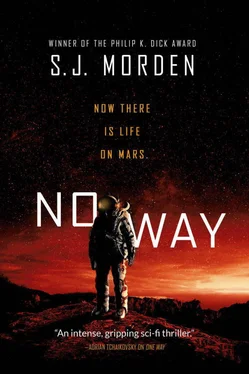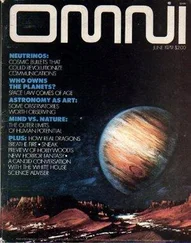She’d been culled, and Alice after her, so that the rest of them would live long enough to build the base. Goddammit, that was brutal. And these were the people he’d just made a bargain with.
“The devil,” said Zeus. “You did it, Frank. I told you not to.”
Zeus was in his suit, but that didn’t stop the smoke from boiling out of him, swirling in his faceplate like clouds.
“Not now, Zeus. Really, not now.”
Rather than look at him, Frank unhooked Brack’s tablet from his waist loop and opened it up to check the manifests of the cylinders. Maybe when he’d done, Zeus would have gone.
The map popped open, and there were the four white crosses down where he expected them. But what the hell was this? The hinterland, the immediate parts of the Tharsis plain from where he’d retrieved the cylinders to build the MBO, were dotted with crosses too.
OK, it was an older version of the map. Brack hadn’t refreshed it for months. All those cargo drops Frank and the others had collected were still marked in their original positions.
No, that wasn’t right. Those were all there, in the boneyard, a bright crowding of crosses that almost obscured the base itself. He refreshed the map anyway, doing a hard reset. The map cleared, and then the crosses all reappeared, inexorably, one by one.
Where had they come from?
Scratch that. They’d come from Earth. Of course they had.
These were XO deliveries. They showed up on his—Brack’s—system, but not on Frank’s own. He knew that if he touched the cross, it’d give him an overview of the inventory. He touched the nearest one to him, which lay a few miles south of the far end of Rahe.
Solar farm.
“Goddammit. Look at this.” He turned and held the tablet out for Zeus to see, but he’d long since disappeared. Then Frank realized what he’d done, and sheepishly turned back.
Spares. They were his spares, dotted about the plain, even more scattershot than the first set of hab components had been. If the map was accurate, some of those were going to be utterly unreachable by a one-man operation.
How long had they been sitting there on the Martian surface? Frank had no way of knowing, but there’d been plenty of activity in the sky above the base for the last few months. Brack had warned them off “space piracy”, but he’d known they were meant for the base all along, and that he’d be going to get them as part of Phase three.
The NASA kit could wait. He was going for a power up. He was tired of having to squeak by. Even though Declan had been a complete pain in the ass about his precious watts, he’d kept them all alive throughout the build and beyond. These new panels had arrived too late for him to enjoy the sudden abundance, but he could refer to them as the Declan Murray Memorial Solar Farm, and see if XO bit.
He opened up the message function on the tablet, and pecked out with his fat finger: “Luisa. You should probably have mentioned the extra supplies earlier. You know that, right? Because that’s a shit-load of extra work for me to do. Let me make myself clear: you need to tell me everything I need to know, before I need to know it, because from now on, every time I find something out for myself, I’ll think you’ve been deliberately hiding it from me, and that you don’t want me to know about it.
“This is going to work on trust, or not at all. And right now, you’ve got to understand that you’ve fucked up. I’m going to collect the panels, and when I’ve brought them back, I’m going to plug them in and turn all the lights on. The rest of the schedule can wait. Don’t do this to me again.”
He sent the message and closed the app down, then checked out what else was waiting for him.
He tabbed another of the crosses, and there was food. Just food. A whole container—six big drums—full of dehydrated food from Earth. As he checked his way through, there was enough lying out there to almost double the size of the base. Hab sections. Wheels for the buggy. Spare fuel cells. Something—what was an In-situ Resource Management Device? It sounded fancy, and it was now his.
He checked his air, and he checked his batteries. Both were good enough to get out onto the plain and retrieve the panels. As ever, if something went wrong with either his suit or his buggy, he was going to die out there, quickly or slowly. No one was going to come and rescue him, because there was no one. But if he wanted the treasure, he was going to have to take the risk.
He looked up at the sky and, more accurately, the time on the tablet. He’d be coming back at dusk, but he had lights and it wasn’t as if he didn’t know where he was heading: Sunset Boulevard was so well used, it had become a groove. He wondered if it could be seen from space. Yes, why not? Dee had named it, and there was no reason why it shouldn’t enter the official records. The first man-made road on Mars.
Frank set off, dust pluming out behind him as he rattled along at a steady twelve. The driven surface was darker than the surrounding landscape, which was covered with an undisturbed salt rime—the same rime that collected on their helmets and pitted the metal wheels of the buggy. Two hours to drive the length of Rahe, up the collapsed part of the crater wall Dee had called Long Beach. Another hour out on the plain to collect the container, then the two hours back.
With the ridge of Beverly Hills to his left, he traversed the crater floor. It was long, it was boring. Boring on Mars had become a thing: although the landscape was alien, it just wasn’t interesting. It wasn’t Mars’s fault, but it was what he’d grown to expect. Red rock, red dust, ocher sky, pale sun. The only living thing on Mars, barring the greenhouse, was inside his suit. Outside of it was so little atmosphere as to be nothing but imperfect vacuum. Mars was dead and cold and airless, and people still wanted to come here to explore and work. Of their own volition, and not press-ganged like Frank.
The drive out of the crater was better. It was certainly more engaging, but only because it was more dangerous. The slope was steep, the surface loose, the hidden shelves of hard, jagged rock a menace. It had to be taken at a decent pace to allow momentum to carry the buggy over the more inconstant portions, but too quick, and the wheels would lose traction. If they did that, and spent any significant time in the air, then the buggy would slew sideways. Rolling it was a real possibility. And even with the roll cage and being strapped in, he was almost certain to wreck the wheels and leave himself stranded, far out of walking range of both the ship, and the base.
Monotony and fear. Those were his two default states and he seemed to be flipping between them with very little warning.
For ten minutes, twenty, it was continuously uphill, with Frank forced back into his seat and looking at nothing but the slope and the sky. The wheels turned and the plates bit, growling and clattering against the crater wall. He could hear it as well as feel it as he battled to keep the buggy facing forward.
Then, as always, the sudden burst of speed and the shallowing out of the gradient, followed by the explosion of so much Mars against his faceplate. The endless miles of nothing. The volcanoes rising directly from the plain ten thousand feet into a sky that was a dome of bluey-brown. An utterly blank landscape that, save for a few limp parachutes, was painted entirely in shades of red.
He stopped on the first patch of level ground, and hopped off to inspect the wheels and the trailer, and to check again his gas and fuel cell levels. It was second nature now, something he did without thinking.
It was late afternoon—just the right time for dust devils to rise up from the plain—and the sun was low over Uranius Mons, casting a huge, diffuse shadow through the dusty air. He opened up the map to check his direction, and saw there was going to be a problem. Neither his own location, nor the cargo, were marked.
Читать дальше












